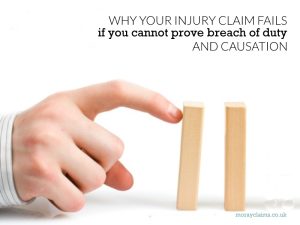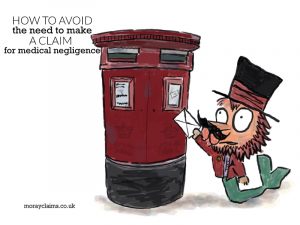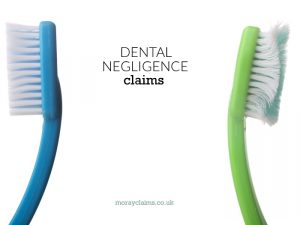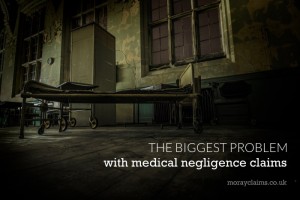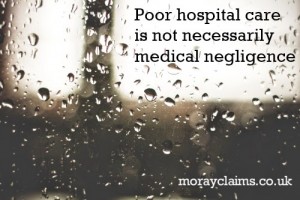When Andrew Kay was 2 years old, he contracted meningitis. It is a dangerous medical condition, causing inflammation of membranes in the central nervous system, and affecting the brain. On 28 November 1975, Andrew was admitted to Seafield Children’s Hospital in Ayr, seriously ill. As part of his treatment, he received an injection of penicillin. The problem was that, by mistake, he was given a massive overdose of penicillin – receiving about 30 (thirty) times the correct dose. In such a quantity, the penicillin was toxic and it caused Andrew to suffer convulsions. He later developed paralysis down one side of his body, though it was short-lived. Andrew recovered from his life-threatening illness, but he was left profoundly deaf. He also had significant learning difficulties. A claim for compensation From 1978, Andrew’s Dad, partly conducting the case himself, made a compensation claim on behalf of his son, raising an action in the Court of Session. Before the judge (in 1984), the Continue Reading
How to avoid the need to make a Medical Negligence Claim
The world record for longest time between a message in a bottle being sent and received is 132 years. 1886 to 2018. It was “posted” as part of research project into ocean shipping routes. The glass container was thrown overboard from a German vessel in the Indian Ocean, washing up on a remote Western Australian beach. If your letter requires someone else to take action, a delay of 100 years or more in someone reading the letter is not going to be good news for you. When you send a letter, you expect it will be received and read within a few days. We all understand that this is how the world works but what if a letter gets lost or delayed? – or is never even sent in the first place. How does this relate to claims for medical negligence? Well, it’s better to avoid having the need to make a personal injury compensation claim – including a medical negligence claim – than to have to go down that road at all. Claims are stressful and compensation levels - even Continue Reading
Dental negligence claims
Rock climber, Alex Honnold, completed the first free-solo ascent of El Capitan, in Yosemite National Park, California in June 2017. In other words, he climbed it by himself – all 2,900 feet of the route known as “Freerider” - without any ropes, taking just under four hours. In a TED Talk about his incredible accomplishment, he explains the sense of anti-climax he had after a previous free-solo first – the ascent of Half Dome (also Yosemite) – in 2012. That peak can also be reached by walkers, via a path up another side of the mountain from the rock face. As he struggled at the crux of the climb, just below the summit, he could hear people chatting and laughing above him, unaware of his presence. He had climbed Half Dome before, with ropes and full climbing gear. On those occasions, because his clothing and equipment marked him out, the regular hikers had greeted him at the mountaintop with gasps of adulation and crowded round him for photos. Not so, on this Continue Reading
The Cost Problem with Medical Negligence Claims (and ways to get round it)
If you are above a certain age, you may remember the following scene. Seated at a table in a San Francisco diner, Inspector Harry Callahan’s first bite of a hotdog is interrupted by the ringing of an alarm in the street outside. Muttering an oath, Inspector Callahan wipes his mouth and heads out to investigate. Stepping onto the sidewalk, he draws and cocks his .44 Magnum revolver. Its cylinder has 6 chambers, each holding one bullet. He sees a car draw up outside the bank across the road and, almost simultaneously, a man backs out of the bank, wielding a shotgun which is pointed into the premises. A bank robbery is in its final stages. Callahan warns the man with the shotgun to “halt” but the robber’s response is to spin and fire in Callahan’s general direction. Callahan downs the robber with a single shot. There are two men in the front of the getaway car. A third runs out of the bank and dives headlong into the vehicle through the open rear passenger window. The car Continue Reading
The Biggest Problem with Medical Negligence Claims
If you consult a solicitor about a possible personal injury claim, you will have a lot of questions. Common examples would be: How much is my claim likely to be worth? How long will it take? But the most important question of all is probably: do I have a claim at all? Lawyers will decide the answer to that on the basis of whether reasonable prospects of success exist. It usually boils down to whether your claim has a better than 50/50 chance of succeeding. So, if the most important question is "Do you think I have a claim?", your solicitor will be keen to reach a view on that issue as quickly as possible. In many situations, your solicitor can reach a provisional view on your prospects of success immediately. They can often give you advice on your chances, just on the initial information you give them. If you’ve been injured in a road traffic accident where another vehicle ran into the back of yours, it was probably their fault. You were on the main road Continue Reading
The Most Important Medical Negligence Case Of The Last 30 Years?
A Lanarkshire mother’s 15-year quest to obtain compensation for injuries her son suffered during birth has ended successfully. Her claim failed twice in the Court of Session but her second and final right of appeal - to the Supreme Court – found all 7 judges to be in her favour. Her solicitor, Fred Tyler of Balfour & Manson, Edinburgh, described the Supreme Court’s decision as “almost certainly the most significant medical negligence judgement in 30 years - a momentous decision which will affect the doctor-patient relationship throughout the UK.” Was he correct to describe it as the most important medical negligence case of the last 30 years? In this article, we look at various ways in which the case of Montgomery –v- Lanarkshire Health Board is significant. Facts of the case Nadine Montgomery is diabetic and gave birth to her son, Sam, in 1999 at Bellshill Maternity Hospital in Lanarkshire. Diabetic women are more likely to have larger-than-average babies and Mrs. Montgomery Continue Reading
Patients Need Honesty about Medical Errors
The Scottish Government is consulting on imposing a “duty of candour” for healthcare providers. In its response to the consultation, the Association of Personal Injury Lawyers (APIL), a not-for-profit organisation which campaigns for the rights of injured people, has emphasised the need for medical and social care staff to be forthcoming and open about medical mistakes. Marie Morrison and Peter Brash of Grigor & Young / Moray Claims are members of APIL and accredited as Senior Litigators by APIL. Grigor & Young’s Elgin Office has corporate accreditation from APIL. An apology would often be enough The experience of most solicitors who deal with claims for medical negligence is that the majority of people who are injured as a result of a medical blunder simply want a clear explanation of what went wrong and what happened. The injured person wants to know that any lessons which could have been learned from the experience have been learned and will be put into practice for the Continue Reading
Poor Hospital Care Is Not Necessarily Medical Negligence
It’s always a worry if you have to have hospital treatment. You’ll be concerned about the procedure or operation, any anaesthetic and the recovery period. The practicalities of your stay in hospital will also be on your mind, such as sharing a ward with others and the quality of the food. You’re unlikely to think about the risk of being injured due to medical negligence during your stay because health service staff are dedicated professionals working hard to deliver the best possible care. Their jobs require them to deal with deadlines and to keep within strict budgets. Sometimes, they have to exercise judgement in making decisions, weighing up competing risks. And medical science is not an exact science. Unfortunately. things don't always work out for the best. You need to understand that, if things go wrong and outcome of your treatment is not as you would wish, just because you have experienced poor standards of care, that does not necessarily mean you have Continue Reading
